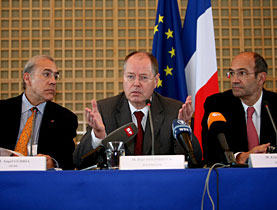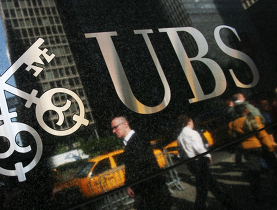Move to blacklist Switzerland as tax haven

German and French finance ministers have issued a joint call for Switzerland to be placed on a blacklist of non-transparent tax havens.
The move was made during a conference on financial transparency in Paris on Tuesday, attended by representatives from 17 countries belonging to the Organisation for Economic Co-operation and Development (OECD).
Those present agreed that the OECD needed to update its blacklist of “uncooperative” tax havens – currently comprising Liechtenstein, Andorra and Monaco – by mid-2009.
The list identifies places that have not committed to work towards OECD standards of transparency and information exchange.
German Finance Minister Peer Steinbrück told a press conference that Switzerland deserved to be on it and criticised the Swiss government for inadequate cooperation on tax matters.
Swiss law does not recognise tax evasion as a criminal offence and banks are only obliged to cooperate with the investigators of other countries if fraud can first be proved. Steinbrück said the system “permitted German tax-payers to commit tax fraud”.
Secret banking
German authorities have pressured Switzerland in the past to crack down on foreign nationals who deposit funds in Swiss banks to avoid paying taxes back home.
“We Germans cannot prove the tax fraud because Switzerland refuses to give us the necessary information,” said Steinbrück.
“I am not questioning the sovereignty of Switzerland or Liechtenstein. It is Germany’s sovereignty that has been harmed by the conditions offered by certain countries.”
He added that tax evasion was an economic and a social problem.
“Secret banking has reached its limits. Switzerland has made progress but its definition of tax fraud is much too limited, we need to go even further,” added French Budget Minister Eric Woerth.
The Swiss government, which turned down an invitation to attend the Paris conference last week, appeared unconcerned at the ministers’ announcement.
A Swiss finance ministry spokesman said they saw “no reason” to react in the short-term and reiterated that Switzerland used an OECD standard practised by the 30 member countries as its basis for sharing bank data.
The Swiss Bankers Association also rejected the criticism, with spokesman Thomas Sutter stating: “Switzerland is not a tax haven.”
He added that Switzerland followed numerous tax conventions that regulate judicial and administrative cooperation on the issue.
Distinction
But Christine Eberlain, of the Berne Declaration, which has been campaigning against Switzerland’s tax haven status for many years, supported the ministers’ comments.
The non-governmental organisation wants to end the Swiss distinction between tax evasion and tax fraud, which it says leaves the system open to manipulation.
“This situation is unique in the world, it is ridiculous. We applaud what they said but on the other hand we would say, ‘make sure you are also doing everything possible to avoid tax evasion in your own country’,” Eberlain told swissinfo.
Back in Switzerland, the idea was vehemently rejected by most of the political parties.
The Christian Democrats said Switzerland respected international transparency rules, while the Swiss People’s Party said Germany should look closer to home, lowering taxes so its residents did not “move their money abroad”.
The Radical Party said it was an effort to put pressure on Switzerland and weaken its economic standing.
Only the Social Democrats, long-time opponents of tax evasion, said the comments should be seen as a warning to other parties, and reflected the reputation of the Swiss financial sector.
The Paris conference is to be followed by another in Berlin in nine months focussing on the fight against non-transparent tax havens.
Angel Gurria, OECD general secretary, said a large majority of the 30 members of the organisation were present in Paris, a sign of widespread support on the issue.
swissinfo, Jessica Dacey
Tax havens are traditionally locations with varying taxation laws.
In 2000 the OECD published a preliminary list of 35 “uncooperative” tax havens. The majority agreed to work toward OECD agreed standards of transparency and the exchange of information, and were no longer classified as uncooperative. Those that did not agree were Andorra, Monaco and Liechtenstein.
In its 2008 report on tax cooperation, the OECD said several states had taken steps to improve information relating to property and access to bank information for tax purposes.
The OECD still considers there to be significant restrictions in the area in three member countries, Switzerland, Austria and Luxembourg and in several off-shore centres including Liechtenstein, Panama and Singapore.
People wishing to dodge paying taxes on their assets can do so by three means: avoidance, evasion and fraud.
Avoidance is the legitimate means of structuring finances so they don’t fall under the scope of taxable assets. This can be done, for example, by setting up a trust fund or by changing country residence or nationality.
Evasion is the deliberate concealing the true state of assets from the tax authorities – in other words, lying about the extent of your assets.
This is a civil offence in Switzerland and some other countries, such as Austria and Liechtenstein, but criminal in most states.
The main distinction between evasion and fraud is that the perpetrator tells lies on official documentation. This is sometimes known as “aggravated” tax evasion.
Unless tax fraud can be proved, Swiss banks are not obliged to hand over details of accounts and client assets to investigators.
In some cases this information is needed before fraud can be established in the first place.

In compliance with the JTI standards
More: SWI swissinfo.ch certified by the Journalism Trust Initiative




You can find an overview of ongoing debates with our journalists here. Please join us!
If you want to start a conversation about a topic raised in this article or want to report factual errors, email us at english@swissinfo.ch.